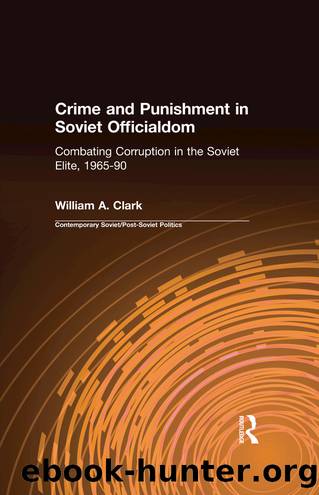Crime and Punishment in Soviet Officialdom: Combating Corruption in the Political Elite, 1965-1990 by William A. Clark

Author:William A. Clark [Clark, William A.]
Language: eng
Format: epub
Tags: Political Science, Public Affairs & Administration
ISBN: 9781563240553
Google: 0VinP2hZRUEC
Goodreads: 3855601
Publisher: Routledge
Published: 1993-01-15T07:54:48+00:00
The Cadres Weapon and the Control of Officialdom
While the above institutions represent the Soviet regime's more active control mechanisms, another method of control makes explicit the notion of an embedded "institutional mistrust" referred to earlier. Like its tsarist predecessor, the Soviet state was a colonial power and, as such, ruled over a vast geographic empire composed of a multitude of peoples representing sometimes strikingly different ethnicities, religions, cultures, languages, customs, traditions, and histories. Colonial empires, whether Roman, Hungarian, Ottoman, British, Russian, or Soviet, present a similar challenge to the dominant group: the challenge of control. In large part, as exemplified by the constant concern of those in power in Moscow with the related issues of nationalism, separatism, regionalism (oblastnichestvo), localism (mestnichestvo), and the development of local satrapy headed by "little tsars," guaranteeing the proper behavior of officials outside the center has been at the root of the problem of centralized colonial control. The recent events of the late 1980s and early 1990s reveal that such a constellation of forces is not to be taken lightly in any state, even one like the Soviet Union with a sizable and determined apparatus aimed at ensuring predictability in these matters. As John H. Miller has put it,
Multi-ethnic polities have opted usually for one of two strategies to maintain their cohesion. One has been the promotion of loyalty to the multi-ethnic system by encouraging the autonomy of local communities, or elites, or their specific contribution to the "commonwealth," or both. The other has been the control or suppression of centrifugal tendencies often accompanied by a policy of assimilation to the 'central' culture.... A predictable feature of such control would be strict supervision from the centre over the selection of administrative personnel in ethnic minority or ethnically mixed areas. The USSR must certainly be classified among the polities inclining towards the latter strategy.52
In maintaining centralized control of the non-Russian Soviet "colonies," Moscow employed the "cadres weapon" to place faithful officials at all levels of the administrative hierarchy. Such a "weapon" entailed much more than the regular employment of the nomenklatura system.
Download
This site does not store any files on its server. We only index and link to content provided by other sites. Please contact the content providers to delete copyright contents if any and email us, we'll remove relevant links or contents immediately.
The Secret History by Donna Tartt(19052)
The Social Justice Warrior Handbook by Lisa De Pasquale(12187)
Thirteen Reasons Why by Jay Asher(8893)
This Is How You Lose Her by Junot Diaz(6877)
Weapons of Math Destruction by Cathy O'Neil(6264)
Zero to One by Peter Thiel(5786)
Beartown by Fredrik Backman(5737)
The Myth of the Strong Leader by Archie Brown(5499)
The Fire Next Time by James Baldwin(5431)
How Democracies Die by Steven Levitsky & Daniel Ziblatt(5215)
Promise Me, Dad by Joe Biden(5141)
Stone's Rules by Roger Stone(5081)
A Higher Loyalty: Truth, Lies, and Leadership by James Comey(4954)
100 Deadly Skills by Clint Emerson(4921)
Rise and Kill First by Ronen Bergman(4779)
Secrecy World by Jake Bernstein(4741)
The David Icke Guide to the Global Conspiracy (and how to end it) by David Icke(4707)
The Farm by Tom Rob Smith(4502)
The Doomsday Machine by Daniel Ellsberg(4484)
